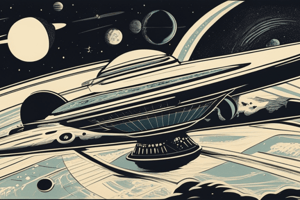Podcast
Questions and Answers
What is the main rationale for exploring space?
What is the main rationale for exploring space?
- Developing military and strategic advantages
- All of the above (correct)
- Advancing scientific research
- Ensuring the future survival of humanity
Which planet in the Solar System has the most known moons?
Which planet in the Solar System has the most known moons?
- Saturn (correct)
- Uranus
- Neptune
- Jupiter
What was the first celestial body to be explored?
What was the first celestial body to be explored?
- The Moon (correct)
- Venus
- Jupiter
- Mars
What is the goal of NASA's Artemis program?
What is the goal of NASA's Artemis program?
What is astrobiology?
What is astrobiology?
What is the Von Braun Paradigm?
What is the Von Braun Paradigm?
What is the goal of the Breakthrough Starshot project?
What is the goal of the Breakthrough Starshot project?
What is the main use of satellites in space?
What is the main use of satellites in space?
What is the main impediment to the development of space for human habitation?
What is the main impediment to the development of space for human habitation?
Flashcards are hidden until you start studying
Study Notes
Exploration of Space, Planets, and Moons
-
Space exploration is the use of astronomy and space technology to explore outer space.
-
Physical space exploration is conducted both by uncrewed robotic space probes and human spaceflight.
-
The Opel-RAK program was the world's first large-scale experimental rocket program leading to the first crewed rocket cars and rocket planes, paving the way for later spaceflight pioneers.
-
Common rationales for exploring space include advancing scientific research, national prestige, uniting different nations, ensuring the future survival of humanity, and developing military and strategic advantages.
-
The early era of space exploration was driven by a "Space Race" between the Soviet Union and the United States.
-
After the first 20 years of exploration, focus shifted from one-off flights to renewable hardware, such as the Space Shuttle program, and from competition to cooperation as with the International Space Station (ISS).
-
Plans for space exploration by the U.S. remain in flux, with Constellation, a Bush Administration program for a return to the Moon by 2020 judged inadequately funded and unrealistic.
-
China initiated a successful crewed spaceflight program while India launched Chandraayan 1, and the European Union and Japan have also planned future crewed space missions.
-
The Sun is a major focus of space exploration, with numerous spacecraft dedicated to observing it.
-
Mercury remains the least explored of the Terrestrial planets, with only two missions that have made close observations of it.
-
Venus was the first target of interplanetary flyby and lander missions and has had more landers sent to it than any other planet in the Solar System.
-
Orbital missions can provide data for Earth that can be difficult or impossible to obtain from a purely ground-based point of reference.
-
The hole in the ozone layer was found by an artificial satellite that contributed significantly to the understanding of a variety of Earth-based phenomena.Space Exploration: From Moon to Pluto and Beyond
-
The Moon was the first celestial body to be explored and was orbited and landed upon by spacecraft, followed by human exploration missions.
-
Mars has been explored by several nations through dozens of robotic spacecraft, though with a high failure rate, and has raised questions about Earth's past and future.
-
Jupiter has been explored through automated NASA spacecraft, with flybys and orbiters, due to its lack of solid surface.
-
Saturn has been explored only through uncrewed spacecraft, including flybys and an orbital mission, and has at least 62 known moons, with Titan being the only moon with an atmosphere denser than Earth's.
-
Uranus has been explored only through the Voyager 2 spacecraft, which discovered its unique atmosphere and magnetosphere, as well as its ring and moon systems, including ten previously unknown moons.
-
Neptune was explored by Voyager 2, which discovered its atmospheric phenomena, auroras, and fastest winds, as well as its ring and moon systems, including five previously unknown moons.
-
Pluto, a dwarf planet, was explored by the New Horizons mission, which made a flyby and scientific observations of the planet and its moon, Charon.
-
Deep space exploration is conducted through human spaceflights and robotic spacecraft, with candidates for future deep space engine technologies including anti-matter, nuclear power, and beamed propulsion.
-
Breakthrough Starshot is a project to develop light sail spacecraft capable of making the journey to Alpha Centauri.
-
Asteroids have been suggested as a gateway for space exploration, providing protection from galactic cosmic rays and a way to extend flight duration and distance capability.
-
The James Webb Space Telescope will provide greatly improved resolution and sensitivity over the Hubble, allowing observations of high redshift objects, and will be deployed in space near the Earth-Sun L2 Lagrangian point.
-
The Artemis program is an ongoing crewed spaceflight program with the goal of landing the first woman and next man on the Moon by 2024, carried out by NASA, U.S. commercial spaceflight companies, and international partners.Overview of Space Exploration
-
NASA's Artemis program is the next step towards establishing a sustainable presence on the Moon, building a lunar economy, and eventually sending humans to Mars.
-
The research conducted by national space exploration agencies generates ongoing economic benefits, inspires youth to study science and engineering, and expands humanity's knowledge.
-
Space exploration is considered a necessity to mankind as staying on Earth could lead to extinction due to lack of natural resources, comets, nuclear war, and worldwide epidemics.
-
The Von Braun Paradigm, formulated by Wernher von Braun, served as the model for efforts in space exploration, with NASA incorporating this approach into the majority of their projects.
-
The public remains largely supportive of both crewed and uncrewed space exploration.
-
Spaceflight is used in space exploration, commercial activities like space tourism and satellite telecommunications, and non-commercial uses like space observatories and reconnaissance satellites.
-
Satellites are used for military and civilian Earth observation, communication, navigation, weather, and research purposes, as well as by space stations and human spacecraft in orbit.
-
Private spaceflight companies like SpaceX and Blue Origin, and commercial space stations like Axiom and Bigelow, have changed the landscape of space exploration.
-
Astrobiology is the interdisciplinary study of life in the universe, focusing on the origin, distribution, and evolution of life.
-
The health effects of space on humans has been well-documented through years of research conducted in the field of aerospace medicine.
-
The lack of private property and the inability or difficulty in establishing property rights in space has been an impediment to the development of space for human habitation.
-
Participation and representation of humanity in space is an issue that has been addressed through international space law and organizations like the Justspace Alliance and IAU featured Inclusive Astronomy.
Studying That Suits You
Use AI to generate personalized quizzes and flashcards to suit your learning preferences.




